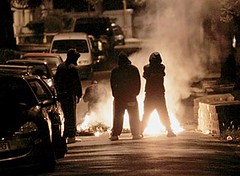
Paris’ dangerous classes and their “hobbies” now open for further bourgeois inspection and titillation:
Paris’ ‘dangerous classes’ and their hobbies
Paris: The Secret History, Andrew Hussey, Bloomsbury, 2007
Philadelphia Inquirer
(Reviewed by Liz Lopatto)
January 21, 2007
The French call them the classes dangereuses and, according to Andrew Hussey’s Paris: The Secret History, their hobbies include art, murder, philosophy, starving, literature, whoring, drinking, rioting, and revolution.
It is hard to go wrong with such subjects, and Paris is a tremendously entertaining read, despite the clunky subtitle. Not much in Paris is actually secret – rather, it is the history of the historically underrepresented “dangerous classes,” the poor, mostly. Hussey spends little time with the Parisian government (unless someone is aiming to overthrow it) and upper classes, so it is best to think of Paris as a supplement to an “official” history rather than the final word. The book is clearly a labor of love, and its light tone makes it a quick read.
Certain hobbies of the French that seem inexplicable to Americans (student riots, nearly legal whoring, dying in ill-advised wars, drinking at all hours) actually have long, proud histories. [Amazing: ignorant Americans.] Even if the reader suspects that getting drunk and starting a riot is not the best use of one’s leisure time, finding out that such riots have a history of nearly a millennium (the first was in 1229) makes the recent student strikes more understandable. As Hussey notes in his introduction, subtitled ‘Autopsy of an Old Whore’, “it is no accident that the word ‘Parisian’ has long been synonymous with the word ‘agitator’.” Indeed…
Hussey has also authored a biography of Guy Debord. According to Ken Knabb, “Andrew Hussey’s The Game of War: The Life and Death of Guy Debord (Jonathan Cape, 2001) is riddled with factual errors. The author’s crude interpretations of Debord’s supposed personal motives are derived primarily from hostile sources and reflect a very superficial understanding of Debord’s project and perspectives.” This doesn’t exactly inspire confidence.
See also : Review by Alan Riding, International Herald Tribune, December 26, 2006; World capital of revolution, Review by Carole Angier, Daily Telegraph, August 13, 2006; Review by Tim Martin, The Independent, July 16, 2006; City of Light’s Dark Side, Review by Donald Morrison, Time, July 9, 2006; Ian Pindar, The hidden city, “Ian Pindar enjoys Andrew Hussey’s tour of the erogenous zones of Paris”, The Guardian, July 8, 2006; Blood red – always � la mode, Review by Peter Ackroyd, The Times, [?]; The Bonnot Gang, Richard Parry, Rebel Press, London, 1987.
In other news, a fatuous review of several new books on ‘punk’ displays the incomprehension typical of (other) cultural mediocrities: Punk wasn’t supposed to be for posterity, “Thirty years after God Save the Queen, the rock genre’s influence has outlasted its own predictions. But why, asks Robert Sandall, do we think it all began in Britain?”, The Australian, January 23, 2007.
‘We’ don’t, Chucky. In September 1976, The Saints independently recorded and distributed copies of their debut single “(I’m) Stranded”; the first ‘punk rock’ act to do so. And they came from Brisbane, not Birmingham, the single being recorded at Windows Studios and released on the band’s own Fatal Records. (Oh c’mon!)
Further, says Sandall, punk had a:
…self-proclaimed leader, Malcolm McLaren, a former art student who ran a fetishistic clothes shop on the King’s Road with his girlfriend, designer Vivienne Westwood. Having recruited a practically tone-deaf Johnny “Rotten” Lydon to sing with the Sex Pistols, “because this was the best selling point”, McLaren understood punk for what it was: an innovative approach to marketing. “If people bought the records for the music, this thing would have died a death long ago,” he once said.
And if his vaunted situationist rhetoric, culled from a French anarchist sect, flew way over the heads of most of the audience, there were lots of other cultural elements in the punk package that had a strong local appeal, and in some cases still do…
Fuck some people are stupid.
(Sandall’s scribblings were originally published as Seeing the Future, in The Times, January 14, 2007.)

Coldplay are my favourite punk band.